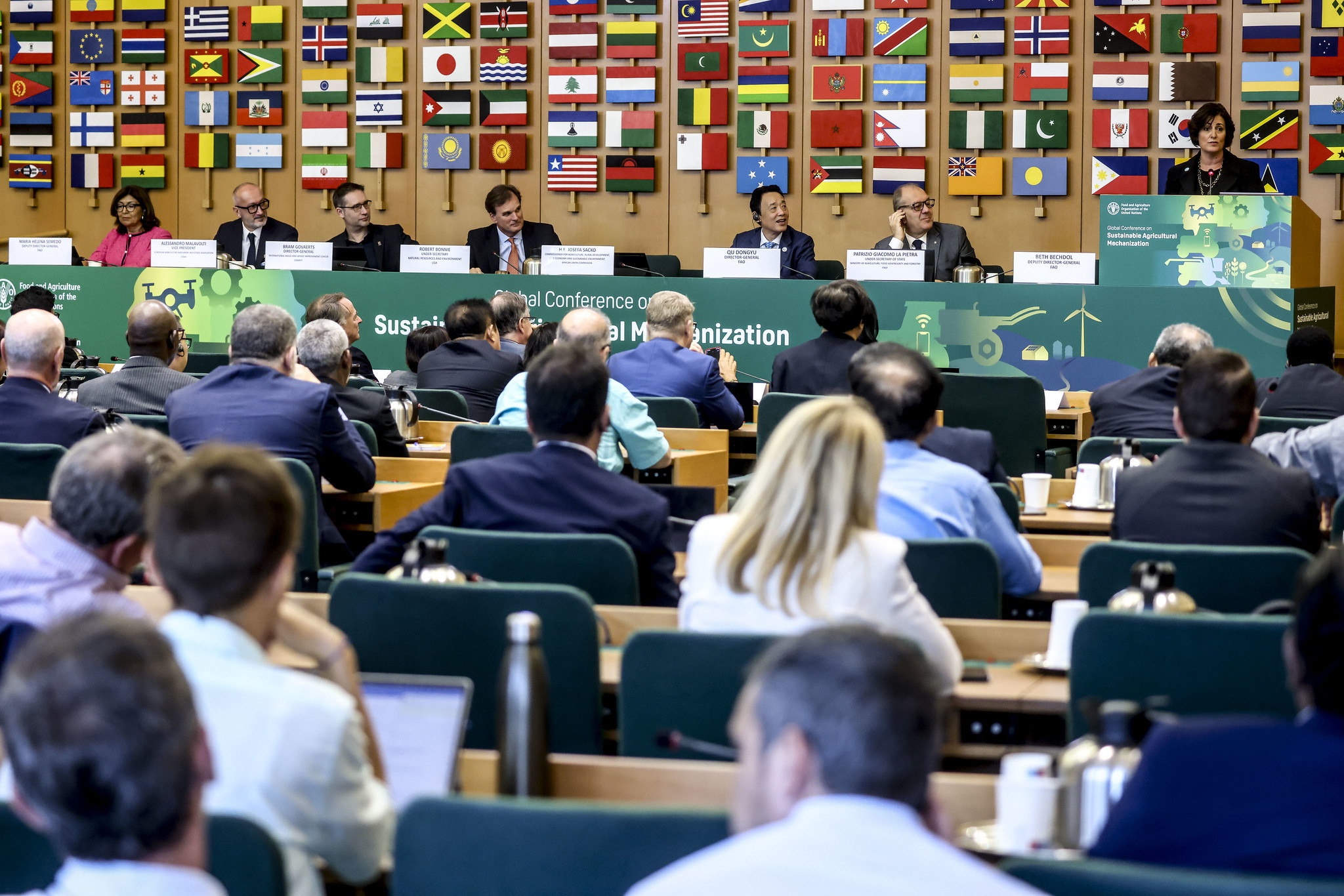FAO Global Conference on Sustainable Agricultural Mechanization forges path ahead
First-ever conference of its kind ends with a Call to Action with 15 key actions as drivers for real change

More than 8,500 participants from around the world took part, either in person or virtually, in FAO's first-ever Global Conference on Sustainable Agricultural Mechanization in Rome.
©FAO/Alessandra Benedetti
Rome - The first-ever Global Conference on Sustainable Agricultural Mechanization by the Food and Agriculture Organization of the United Nations (FAO) ended today with a Call to Action comprising 15 key actions designed to accelerate the transformation of global agrifood systems to make them more efficient, inclusive, resilient, and sustainable.
Held in hybrid form at FAO's headquarters in Rome, the conference saw more than 8,500 participants from around the world engage in a series of discussions highlighting the contributions and benefits stemming from the sustainable development of agricultural mechanization.
The Call to Action, issued at the end of the three-day gathering, supports the implementation of FAO's Strategic Framework 2022-31 and the achievement of the Sustainable Development Goals (SDGs).
FAO Director-General QU Dongyu described them as forward-looking, noting that they will "serve as a guide to drive real change, challenge how we work, and advocate for furthering sustainable agriculture mechanization."
In summing up the conference, the Director-General highlighted four key points generated by the discussions:
- Solutions must be prepared for farmers, with farmers and by farmers, since farmers are on the frontlines of various threats, from the impacts of climate change, extreme weather events, plant pest and diseases, antimicrobial resistance and other threats.
- The private sector is expected to play a key role in driving the development of new and emerging technologies and should ensure such developments are sustainable, economically viable, affordable, and accessible to all.
- There's a need for enabling policies underpinned by scientific advances that allow sustainable agricultural mechanization to thrive.
- Strategic partnerships are crucial to mobilize knowledge, resources and innovations, and to develop evidence-based solutions.
The conference was accompanied by a one-of-a kind exhibition showcasing some of the latest technical developments in agricultural machinery across the agrifood value chain, alongside farming equipment of all sizes and scale that has provided innovative solutions to economic, social, and environmental challenges. It was also preceded by a conference on sustainable livestock transformation, another first for FAO.
Call to Action
The Call to Action to national governments was the result of discussions coming from the conference’s seven thematic sessions.
They include calls to: increase farm power access through a variety of business models and financing schemes; invest and promote precision technologies for crop production including protected cultivation, especially for smallholder farming systems; establish post-harvest supply chains joint ventures in affordable, high-tech, structural and mechanical designs and logistic systems combined with quality monitoring, prediction, and control methods towards a zero-waste fresh food chain; incentivize climate-smart, conservation and precision agriculture type mechanization and management systems; commit to the development of technology tailored to the needs of small-holder farmers, enhancing their digital skills; strengthen machinery supply chains; facilitate trade by encouraging the development and harmonization of standards, test protocols and data for agricultural machinery, equipment and implements; and promote innovative and inclusive business models along the value chain, with the involvement of farmers, investors, small- and medium-sized businesses.
FAO, for its part, committed itself to continue to provide technical support at country, regional and global levels through its existing and new channels; encourage, lead and convene more policy dialogues; and support countries and national governments in developing and implementing national policies, regulations and laws that support sustainable development of agricultural mechanization.
Qu also informed the conference that he recently created an Office for Youth and Women in order to prioritize their involvement and recognize their contributions to agriculture.
"We are committed to working together to contribute to building a better world, for generations to come," the Director-General said.Contact
FAO News and Media (+39) 06 570 53625 [email protected]
Nicholas Rigillo FAO News and Media (Rome) [email protected]
